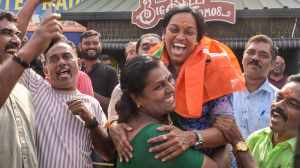How do SGPC elections work? Why have they not been held in 13 years?
Elections for the Shiromani Gurdwara Parbandhak Committee are supposed to be held every five years. But none have taken place since 2011. Why?
 The SGPC operates out of the Teja Singh Samundri Hall in the Golden Temple complex in Amritsar. (Wikimedia Commons)
The SGPC operates out of the Teja Singh Samundri Hall in the Golden Temple complex in Amritsar. (Wikimedia Commons)Of the 170 Shiromani Gurdwara Parbandhak Committee (SGPC) members elected in 2011, at least 30 have died in the last 13 years. Although elections for the committee are supposed to be held every five years, none have taken place for well over a decade.
The Shiromani Akali Dal (Badal), which won the SGPC elections in 2011, has lost two Assembly elections in Punjab in the same period. Critics say that the only reason why the party still holds a majority in the SGPC house is due to the lack of fresh elections being held.
Here is how the SGPC elections work, and why they have not been held since 2011.
First, what is the SGPC?
The SGPC is the apex governing body of all Sikh gurdwaras in the states of Punjab and Himachal Pradesh, and the Union Territory of Chandigarh. It was established on November 15, 1920 in Amritsar, originally to administer the Darbar Sahib gurdwara and other historically important gurdwaras.
In the 19th century, Punjab, now under British control, saw a rise of Christian missionary activity and the formation of Arya Samaj, a Hindu reform movement. It is in this context that the Singh Sabha movement began among Sikhs to arrest what was termed as the “degradation of Sikh thought and principles” in daily life.
But the control of Darbar Sahib and other gurdwaras remained in the hands of powerful mahants (priests) who enjoyed tacit support from the British. These mahants treated gurdwaras as their personal fiefdoms. They encouraged practices in violation of the tenets of Sikhism, such as idol worship and discrimination against Dalit Sikhs.
The SGPC was created to replace the unpopular mahants, and govern Sikh gurdwaras as per the tenets of Sikhism. In the years after its creation, the SGPC managed to seize control of many gurdwaras, although things would often turn violent. Finally, the British passed the Gurdwaras Act, 1925 which gave the SGPC legal recognition and turned it into a democratic body to govern gurdwaras.
How do SGPC elections work?
There are a total of 170 elected members of the SGPC. In addition, there are 15 nominated members, 5 heads of the Takhts (Sikh temporal seats), and the head granthi (chief priest) of the Golden Temple.
The Gurdwara Election Commission is a statutory body under the 1925 Act that is responsible for holding the SGPC elections. The Gurdwara Election Commission Chairman is appointed by the Union Home Ministry to oversee the elections. This person has the authority to hold elections in coordination with the Punjab government, which provides security and other resources.
The Centre appointed Justice S S Saron (retired), formerly of the Punjab and Haryana High Court, as the chairman of the Gurdwara Election Commission in October 2020. However, Saron began the process of preparing electoral rolls only in May this year. SGPC voters are registered in the same manner as voters in general elections, and the elections also take place on similar lines. Any eligible person can approach appointed election officials to register themselves as voters.
Who can become a voter in SGPC elections?
There are four main conditions to become a voter in SGPC elections. At the time of enrolment, a person must sign a declaration saying that:
- They maintain unshorn hair;
- They do not drink alcohol;
- They do not consume halal meat; and
- They do not consume tobacco.
Moreover, voters must be Sikhs of the age of 21 and above. This time, Sikhs from Punjab, Himachal Pradesh, and Chandigarh will be allowed to cast their vote. Voters from Haryana will not participate, as the state now has its own Haryana Sikh Gurdwara Management Committee.
So far, more than 5 million voters have been registered for the SGPC elections since last October. The 2011 elections had 5.6 million registered voters, most of whom were from Punjab (5.27 million), followed by Haryana (337,000), Himachal Pradesh (23,011), and Chandigarh (11,932).
Why were elections delayed?
Many Sikh groups have demanded fresh elections be held since 2016. Still, the house elected in 2011 is still functioning.
A legal issue was behind the initial delay of SGPC elections. In December 2011, the Punjab and Haryana High Court nullified the SGPC polls held in September that year, and restored the voting rights of Sehajdhari Sikhs (Sikhs with shorn hair) by quashing the 2003 notification by the Centre. This notification had barred Sehajdhari Sikhs from casting their vote in 2011. During the hearings of the so-called Sehajdhari voting rights case, the court made it clear that the poll results in 2011 would be subject to the verdict in the matter.
In February 2012, the SGPC moved the Supreme Court challenging the order of the Punjab and Haryana High Court. The Supreme Court, however, too as long as 2016 — the year fresh elections were to be held — to reinstate the SGPC house from 2011.
That said, even this reinstated house completed its five-year term in 2021. After coming to power in Punjab in 2022, the Aam Aadmi Party government recommended to the Centre that the SGPC elections be conducted as soon as possible.
- 01
- 02
- 03
- 04
- 05






































